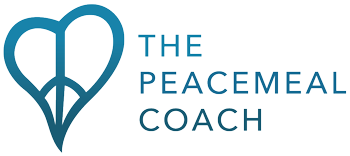Recommended Resources
One of the best things you can do when your teen is diagnosed with anorexia is to learn as much about the illness as you can as quickly as you can. No parent wants to have to become an expert on their child’s eating disorder, but knowing what you are dealing with and what to expect will equip you with the knowledge you need to support your teen’s recovery.
I’ve compiled a list of books that were helpful to me throughout my daughter’s diagnosis, treatment, and recovery. I discovered these resources at some point during my experience caring for my anorexic teen, and I want to share them with you. Each of the books was useful to me at some point along the way. While it isn’t necessary to read all of the books I’m recommending, it can be helpful to pick one or two to start. In addition to the books I found most helpful, I am also recommending a website that was an invaluable resource for me while my daughter was struggling with anorexia.
Wherever you are in the process of your child’s recovery, good resources can help you make more progress, get you unstuck, or give you the boost of encouragement you need to keep going. I hope you find these recommendations helpful.
If you have specific questions or want more information about the resources I’ve included, email me at jenni@peacemealcoach.com.
Books
When Your Teen Has An Eating Disorder
Practical Strategies to Help Your Teen Recover from Anorexia, Bulimia & Binge Eating
A Family-Based Treatment to Help: Manage Meals, Handle Bingeing, Purging & Exercise, and Prevent Relapse, Lauren Mulheim, PsyD, New Harbinger Publications, 2018.
This book is an encouraging and practical guide for parents who are supporting their teen’s eating disorder recovery at home. When Your Teen Has An Eating Disorder provides evidence-based strategies to confront the complex challenges parents of teens with eating disorders face on the road to recovery. Dr. Mulheim’s book is comprehensive while also being concise, allowing parents to quickly access and apply appropriate strategies.
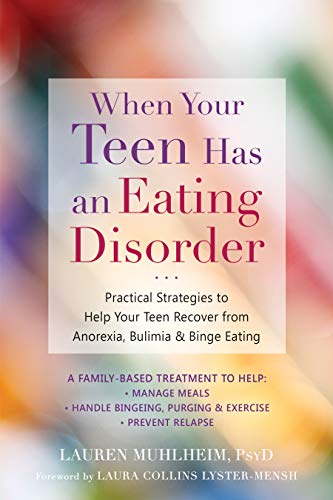
Anorexia and Other Eating Disorders
How To Help Your Child Eat Well And Be Well
Practical Solutions, Compassionate Communication Tools and Emotional Support for Parents of Children and Teenagers, Eva Musby, APRICA, 2014.
Eva Musby is a parent who successfully supported her child through anorexia recovery. In How To Help Your Child Eat Well and Be Well, she details the evidence-based Family-Based Treatment (FBT) approach from a mom’s perspective. Her compassion and commitment come through on every page. She provides practical how-to advice for parents to effectively support their child’s recovery. The result is an empowering explanation of how important parents are to the treatment and recovery process.
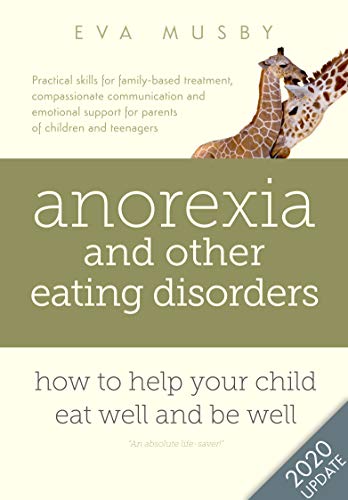
Treatment Manual For Anorexia Nervosa
A Family-Based Approach, James Lock & Daniel LeGrange, Second Edition, The Guilford Press, 2015.
This manual, designed for Family-Based Treatment (FBT) therapists, explains the three phases of FBT with a session by session description. Because research shows FBT to be the most effective treatment for teens with anorexia, Treatment Manual For Anorexia Nervosa is an important resource not only for treatment professionals, but also for parents of anorexic teens. If you want to know as much as possible about FBT and the key role that parents play in recovery, this manual is a great tool.
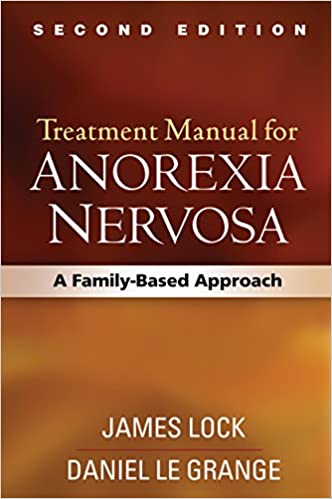
Help Your Teenager Beat An Eating Disorder
James Lock & Daniel LeGrange, Second Edition, The Guilford Press, 2015.
Dr. James Lock and Dr. Daniel Le Grange, leading eating disorder experts, explain how parents can become actively involved in their teen’s recovery and why it is so important for parents to take charge. Their book includes research findings and resources to help parents understand eating disorders and guide them to find the most effective treatment for their teen. Specifically, Help Your Teenager Beat An Eating Disorder, teaches parents how to apply FBT to help their teen overcome an eating disorder.
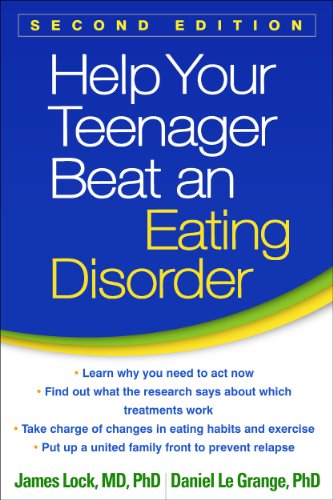
Skills-Based Caring For A Loved One With An Eating Disorder
The New Maudsley Method, Second Edition, Janet Treasure, Grainne Smith & Anna Crane, Routledge, 2017.
This manual focuses on developing skills to effectively deal with the complex and extreme behaviors that characterize eating disorders. The book is written for anyone who is caring for someone with an eating disorder whether that person is a parent or a treatment provider. It is a good resource to turn to when you encounter an extreme behavior that you don’t know how to handle. Skills-Based Caring For A Loved One With An Eating Disorder provides strategies to address many of the challenges that parents face when their teen has anorexia. For example, the book provides detailed instruction on how to remain calm and compassionate instead of automatically reacting to eating disorder behaviors. Each chapter concludes with Reflection Points that summarize the important things to remember and Action Points that suggest steps to take in order to apply what was learned.
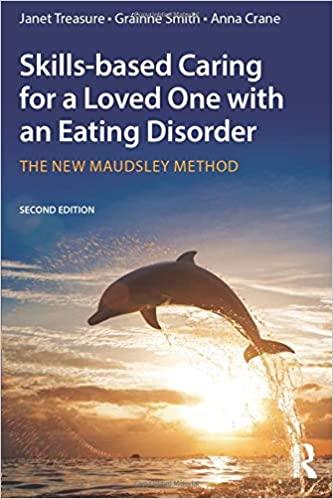
Sick Enough
A Guide To The Medical Complications of Eating Disorders, Jennifer L. Gaudiani, MD,CEDS, FAED, Routledge, 2019.
Dr. Guadiani is an internal medicine specialist who is internationally recognized for her work on the medical complications of eating disorders. In Sick Enough, she addresses the medical problems caused by eating disorders that are sometimes missed or dismissed, but are important to diagnosis and treatment. Dr. Guadiani uses case examples to illustrate the complexities of diagnosis, treatment and recovery in a diversity of patients including Type 1 Diabetics, ARFID patients, athletes, and males. Eating disorder patients, their loved ones and their clinicians will all benefit from the valuable medical information this book provides.
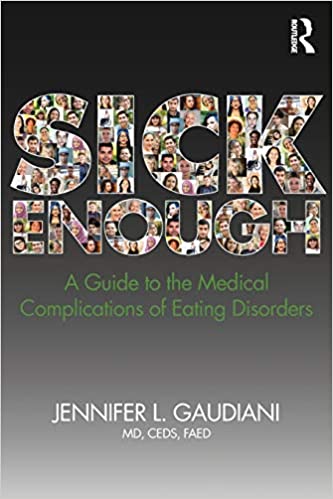
Decoding Anorexia
How Breakthroughs in Science Offer Hope For Eating Disorders, Carrie Arnold, Routledge, 2013.
This book explains the biological differences that predispose some teens to anorexia. From a scientific but clear point of view, Decoding Anorexia provides insight into the brain-based nature of anorexia. Find out what characteristics put someone at a greater risk of developing anorexia, what happens in the reward system of the brain in anorexics when they restrict eating, and why anorexia behavior is so hard to stop. The combination of research findings along with Carrie Arnold’s personal experience with anorexia makes this book an important resource for parents who want to learn more about the science behind their teen’s eating disorder .
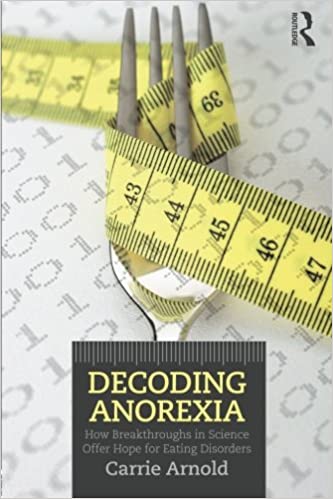
Rehabilitate, Rewire, Recover!
Anorexia Recovery For The Determined Adult, Tabitha Farrar, CreateSpace Independent Publishing Platform, 2018.
In Rehabilitate, Rewire, Recover!, Tabitha Farrar shares her own experience with anorexia and recovery, as well as the experience of other adults in recovery from anorexia. Her book provides practical tools to learn to eat without restriction, extinguish compulsive exercise, minimize OCD behaviors, and customize a recovery plan. This book is written for the adult recovering from anorexia, but it is an excellent resource for parents who want to understand anorexia from their teen’s perspective. In addition, once nutritionally rehabilitated, this book provides a roadmap for how to rewire neural pathways for recovery. Tabatha Farrar’s personal struggle with anorexia and her success in recovery make this book a powerful and relevant resource for anyone who is impacted by the illness.
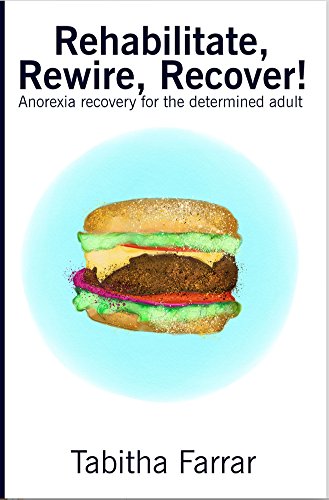
Website
F.E.A.S.T. — Families Empowered and Supporting Treatment for Eating Disorders
feast-ed.org
F.E.A.S.T. is a community of parents of those with eating disorders that provides information and support to caregivers. This website is a place for parents to go to find other parents who have been through what they are going through. F.E.A.S.T. works to empower parents to find evidence-based treatment and to believe in recovery. This website will keep you informed of the latest eating disorder research, educate you on how you to become involved in your teen’s recovery, and provide you with supportive resources.
F.E.A.S.T. features an Around The Dinner Table Forum where parents can go to post questions, share concerns, and find support. The forum is moderated by experienced parent caregivers who know how to help parents as they navigate the ups and downs of eating disorder treatment and recovery. When it seems like no one else could possibly know what you are experiencing, ATDT provides a community of mutual support and understanding. I strongly encourage anyone caring for someone with anorexia to visit the F.E.A.S.T. website and to participate in the ATDT Forum.
